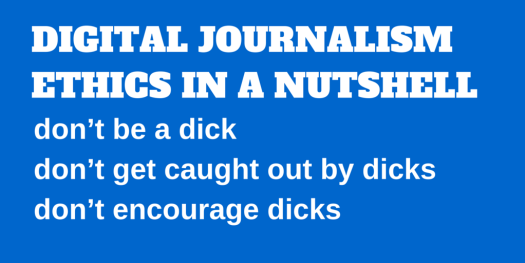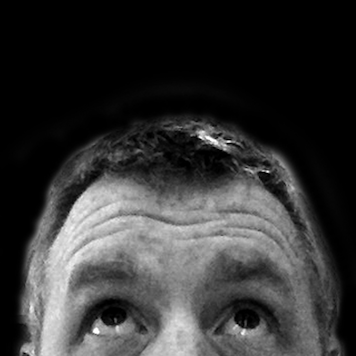Journalism Ethics in a digital world: In an nutshell

For the last six years or so I’ve done a guest lecture on a colleague’s Journalism Ethics module around the title ethics in a digital world. All the lectures tend to be around the same theme – if you want to be treated as a journalist, you need to behave like one and that might be at odds with the way everyone else does it.
The slide above represents the lightbulb moment when I realised what that six years really boiled down to.
The detail is in what that means, who sets the behaviour etc. is the lecture – these sitting through it might have preferred the slide! It’s also worth noting that my attempts to wrestle with the issue have resulted in a little of the devils-advocate/challenging ideas. This is presented in the same spirit.
So, here’s a bit of meat on the bones (not the whole lecture) of the slide for which I am massively indebted to Wil Wheaton for https://dontbeadickday.com/
Background
As I’ve researched the lectures, one thing thats become clear is that most conversation around journalism ethics conversations fall into one of two categories:
- Legal issues – most of what are considered ethical issues are actually legal issues. This seems especially common around the issue of comments and using user generated content and social media.
- Most ethics codes are about the process not of being fair and good but of not looking like a dick/idiot.
A good example of number 2 is the use of material from social media. A lot of ethical guidelines focus on the way you can verify images and multimedia from social media so that you don’t fall foul of hoaxes or people with agendas. Outsides of a, frankly academic, debated about the difference between professional ethics and, well, ethics, I don’t see fact checking as an “ethical issue”. Integrity? Brand protection? Yes. Ethics? No.
Ethics asks you why you did something not how.
On being an idiot
It could be argued that no one wants to look like an idiot but experience has taught me that this very much depends on the audience and if nothing else, as journalists we play to an audience. The web and social media in particular have been instrumental in giving the audience a voice, but they have also raised the curtain on journalism and allowed all journalists, not just the chosen few a channel for their own voice and the audience that comes with the social and cultural capital journalism as a profession gives us. More chance to be seen and heard and more chance to be ‘unethical’.

Katy Hopkins: The Ethical Journalist?
You may look, for examples, at Katy Hopkins and think* Idiot!** But there’s a huge audience who think that she isn’t. So, she doesn’t care if you think she’s an idiot and neither do they. You may, fully believe that you’re right and she isn’t, make this point clear to her and her followers (who by association you think are idiots too); feel good about it but reap the vitriolic whirlwind that follows.
If you did it because you genuinely think they are idiots and you need them to know that – well done! Stick to your guns and fight your corner and that’s an ethical decision. Do it to get a few articles/retweets and follows out of it – less so. Ethically you’re in danger of being as much of an idiot as they are.
Increasingly the underlying argument by many media ethics people (interpreting journalists actions and responses) is that in a digital world to be ‘ethical’, you have to ask yourself why you’re doing something not just rely on the existing structures around you – in many peoples eyes the underpinning principles of those structures (balance etc.) aren’t fit for purpose anymore. You also need to be happy that you’ve thought deeply about it, but you’re also prepared to live with the consequences.
I realise that by this definition, it could be argued that Katy Hopkins is actually quite ethical. On two of my counts. Maybe. But she falls foul of the last one. Because no matter how existential your own reasoning may be, as a human being (not a journalist) you still have a duty of care – we’re not Iain Duncan Smith!. So if what you do intentionally causes harm to others and you know it will, that’s not ethical.
Here’s a less contentious/cleaner version for your newsroom.

(I’m using idiot and dick interchangeably here)
